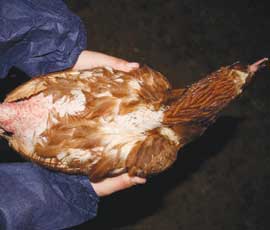New guide to avoid feather pecking

A new website has been launched to help make sure laying hens are well-feathered throughout their lives.
Developed by scientists at the University of Bristol and endorsed by the poultry industry, the FeatherWel website focuses on management strategies to help prevent pecking damage from day old chicks, through rear, onto transfer and throughout lay.
All forms of injurious pecking, including gentle and severe feather pecking, vent pecking and cannibalism are described, with photographic examples. In addition, there is a forum where farmers can share their experiences in managing flocks.
Dr Claire Weeks, senior research fellow in animal welfare at the School of Veterinary Sciences, who led the project, said: “When it comes to abnormal pecking behaviour, most farmers are well aware that prevention is easier than cure. A trial of the advice in the management package on 100 farms as part of the Bristol Pecking Project found that using as many management strategies together as possible was the most effective way of achieving a fully-feathered flock.”
Hens mainly lose feathers through other birds pecking at them – a redirected foraging behaviour. The most common reasons for this are poor litter quality and limited foraging opportunities. Aimed principally at free-range systems, the website emphasises the importance of providing good access to a quality pasture with cover to maximise the opportunities for hens to forage while feeling secure.
“BEIC is fully supportive of this guide which will help in assisting producers to implement measures that can help prevent injurious feather pecking, provided it forms part of the overall professional advice available to producers.” said chief executive of the British Egg Industry Council, Mark Williams.
Alice Clark of the RSPCA added: “Injurious pecking is a serious laying hen welfare issue, which can lead to significant injuries and even cannibalism. We believe the FeatherWel website is a valuable new resource which can help reduce and prevent these problems.”
The availability of this information is timely as the industry faces a possible ban on beak-trimming.
The Bristol team is currently trialling the advice in the management package on 20 commercial flocks where the birds have intact beaks, to provide information for the government’s review in 2015 ahead of the proposed ban from 2016.
* The FeatherWel project was led by the University of Bristol’s School of Veterinary Sciences in collaboration with the Soil Association and the AssureWel project. It was supported by the Tubney Charitable Trust. A 24-page booklet on “Improving Feather Cover” can be downloaded from the website.
For more on the Bristol project and advice on feather peking check out the July issue of Poultry World
